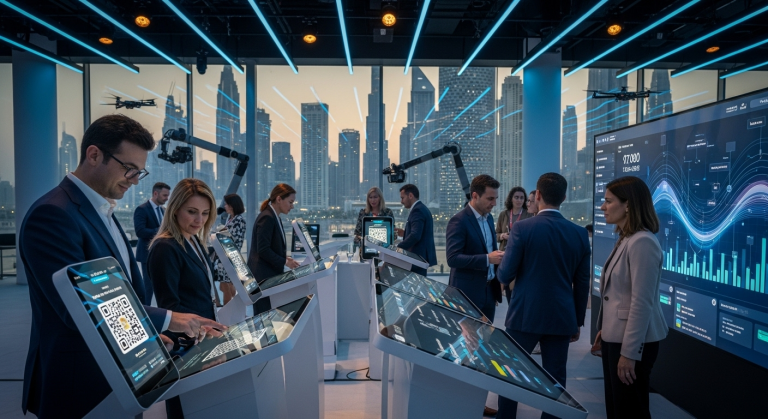Market Analysis and Opportunities
The virtual event ticketing platform sector in the United Arab Emirates (UAE), and particularly in Dubai, represents a rapidly expanding segment within the broader events and technology industry. Demand for seamless, digital-first event solutions has intensified as both business and consumer behavior shifts toward convenience, safety, and digital engagement. Understanding the UAE’s market dynamics is critical for stakeholder decision-making and sets the foundation for a high-growth business in Dubai.
Target Market Analysis
The UAE’s events industry is projected to reach USD 2.3 billion by 2026, with Dubai accounting for a significant share due to its status as a global events hub (Source: Dubai Calendar, Statista). The Compound Annual Growth Rate (CAGR) for virtual and hybrid events in the region ranges from 10% to 20% per year, fueled by increased digital adoption and government initiatives promoting smart city solutions.
- Consumer Behavior: Residents and expatriates in Dubai value convenience, security, and variety. There is a strong appetite for diverse event experiences, including entertainment, conferences, exhibitions, and sporting events, with consumers showing increased openness to virtual and hybrid formats.
- Purchasing Patterns: Over 85% of UAE consumers prefer digital platforms for ticket purchases due to enhanced user experience, price transparency, and secure payment gateways (Source: Gulf News).
- Key Trends:
- Integration of mobile ticketing and contactless payments
- Demand for real-time event updates and personalized content
- Sustainability and paperless event solutions
- Rise of hybrid (physical plus virtual) event models
Marketing Needs
A tailored marketing strategy is essential to penetrate Dubai’s competitive tech market.
- Market Research: Deep dive into local event organizers, audience demographics, and partnered venues is essential to identify gaps and opportunities.
- Digital Campaigns:
- Invest in targeted Search Engine Optimization (SEO) to capture event-goers searching for tickets online
- Utilize Pay Per Click (PPC) ads and retargeting to maximize conversion
- Engage on social media platforms like Instagram, Facebook, and LinkedIn, which are highly popular in the UAE
- Branding: Develop a local brand identity that positions the platform as trustworthy, innovative, and culturally attuned.
- Recommended Tactics:
- Collaborate with influencers and local venues
- Create engaging, mobile-optimized content
- Run introductory promotions and referral programs
Expansion Potential
With Dubai’s cosmopolitan population and strategic geographic location, a virtual event ticketing platform can quickly scale across the UAE and into the broader Gulf Cooperation Council (GCC) region.
- Opportunities to diversify offerings to B2B clients (corporate event organizers) and B2C consumers (concerts, expos, sports)
- Potential export markets include Saudi Arabia, Qatar, Bahrain, and Oman, where demand for digital event services is rising
- Partnerships with regional event organizers, hospitality companies, and government agencies support scalability
Comprehensive Business Overview
A virtual event ticketing platform provides end-to-end digital solutions for buying, selling, organizing, and managing virtual and hybrid event experiences. By leveraging cloud technology and mobile integration, the goal is to digitize and simplify the ticketing process for event organizers and attendees across the UAE, with an initial focus on Dubai.
Business Model and Industry
- Industry: Events, Technology, and Digital Services
- Business Model: Transactional (commission per ticket sold), Subscription-based for organizers, and value-added services (analytics, marketing tools, custom branding)
- Target Audience: Event organizers, corporate clients, entertainment venues, concert producers, sports organizations, and end consumers
- Operational Scope: Starts within Dubai, with scalability across the UAE and GCC
Mission, Vision, and Objectives
- Mission: Empower event experiences in Dubai and beyond through innovative, accessible, and secure ticketing technology
- Vision: To be the leading virtual event platform in the Middle East, transforming the way events are attended and managed
- Objectives:
- Deliver seamless customer experiences
- Enable event organizers to maximize reach and revenue
- Promote sustainability with paperless, digital-first solutions
- Pioneer new technologies in the region’s events industry
Stage and Location
This opportunity is ideally placed in Dubai at the growth stage, leveraging Free Zone locations such as Dubai Internet City for ease of setup, 100% foreign ownership, and streamlined licensing.
Competitive Advantage
The unique value proposition of a well-tailored virtual event ticketing platform emerges across several stakeholder perspectives:
For Entrepreneurs
- Proven revenue model with high margins and low inventory risk
- Rapid scalability potential due to cloud-based infrastructure
- First-mover advantage in a region with high digital event adoption but limited specialized platforms
- Support from Dubai’s pro-business regulatory environment
For Investors
- Strong growth potential supported by Dubai’s expanding events landscape
- Recurring revenues via subscriptions and transaction fees
- Potential for attractive exit strategies through acquisition by larger tech or ticketing firms
- Alignment with government digital transformation strategies, increasing policy support
For Managers
- Efficient, scalable operations enabled by automation and cloud solutions
- Ability to leverage data analytics for user targeting and retention
- Reduced administrative overhead with technology-driven processes
- Opportunities for exclusive partnerships with venues, artists, and event organizers
Supported by Proprietary Technology
Implementation of proprietary or custom-developed ticketing software ensures robust security, real-time analytics, and user-friendly features, giving a distinct edge over generic solutions.
Financial and Investment Needs
Financial Requirements
A comprehensive breakdown for launching and growing a virtual event ticketing platform in Dubai:
- Initial Setup: AED 250,000–400,000
- Company registration (Free Zone or Mainland): AED 20,000–50,000
- Technology development (platform build, mobile app): AED 100,000–150,000
- Office space (virtual or physical): AED 40,000–80,000
- Initial staffing: AED 50,000–70,000
- Marketing and branding: AED 40,000–50,000
- Licensing and legal: AED 10,000–20,000
- Expansion/Optimization:
- Ongoing marketing: AED 10,000–20,000/month
- R&D for advanced features: AED 50,000–100,000 per phase
Investment Potential
Dubai business opportunities are highly attractive for investors due to:
- High digital adoption and robust event sector recovery post-pandemic
- Revenue diversification via multiple event segments (entertainment, sports, expo, corporate)
- High scalability and replicability across the GCC
- Viable investment models: equity stakes for early-stage investors, venture capital for tech scale, or convertible debt
To further understand regional investor interests, consider investment consulting services.
Financial Risks and Mitigation
- Cash flow disruptions, particularly in early phases or seasonal lulls
- Potential currency fluctuations affecting cross-border event payments
- Setup costs that can be high if not optimized (office, legal, talent)
- Mitigation Strategies:
- Diversify revenue (subscriptions, digital ads, B2B deals)
- Adopt robust financial controls and project management
- Consider insurance and legal consulting for liability protection
Human Resources and Recruitment
Workforce Needs
Launching and sustaining a virtual event ticketing business in Dubai requires:
- Core tech team: 2–4 software developers (web, mobile, cloud)
- Marketing and content: 1–2 digital marketing specialists
- Business development: 1–2 managers with local market expertise
- Customer support: 2–4 agents (bilingual Arabic/English preferred)
Critical skills: software development, UX/UI, digital marketing, data analytics, business development.
HR Challenges
- Intense competition for tech and digital marketing talent
- Retention issues due to demand for skilled professionals
- Solutions:
- Offer competitive compensation and benefit packages
- Provide career development training, certifications, and mentorship programs
- Promote flexible working arrangements and a strong company culture
Compliance with UAE Labor Laws
Aligning with local labor regulations is essential:
- Ensure legal employment contracts with clear terms
- Visa sponsorship for expatriates per Free Zone/Mainland requirements
- Compliance with end-of-service benefits and worker protections under UAE laws
Consulting professional business setup services streamlines HR compliance.
Infrastructure and Operations
Infrastructure Needs
A scalable platform requires:
- Cloud-based hosting (AWS, Azure, or local providers)
- High-availability internet and secure data storage
- Modern, ergonomic office or access to co-working spaces (e.g., WeWork, Servcorp)
- Customer support hardware/software and collaboration tools (Slack, Zoom, Jira)
Operational Optimization
- Potential weaknesses: fragmented vendor management, manual ticket processing, or siloed customer support
- Actionable Improvements:
- Integrate Enterprise Resource Planning (ERP) and Customer Relationship Management (CRM) systems
- Automate ticket auditing, financial tracking, and reporting
- Establish knowledge base and self-service portals for clients
Legal Compliance
- Register the entity with Dubai’s Department of Economic Development (DED) or select a suitable Free Zone
- Secure necessary trade licenses for IT and events management
- Open corporate bank accounts compliant with UAE/KYC laws
- Secure data privacy and cybersecurity certifications
Staying updated via trusted resources like industry news is recommended.
Innovation and Technology
The use of emerging tech underpins competitive advantage:
- Blockchain for secure, tamper-proof ticketing
- AI-driven event recommendations and customer insights
- Mobile-first, cloud-native architecture for scalability
- Integration with digital wallets and regional payment systems
Further digitization with analytics, AI chatbots, and virtual event streaming can ensure the platform stays ahead of the curve.
Marketing and Branding Strategies
Brand Status
A successful virtual event ticketing business in Dubai must stand for innovation, trust, and local relevance. Key steps:
- Create a distinctive brand identity with Arabic/English adaptability
- Align visuals and tone with Dubai’s cosmopolitan spirit
- Showcase endorsements from prominent event organizers or partners
Monitor and adapt via insights from platforms such as the Persian Horizon blog.
Marketing Channels
- Digital presence: Maximize SEO for event keywords, run PPC campaigns, and leverage email/SMS marketing for lead nurturing
- Social media: Instagram, TikTok, LinkedIn for both B2C and B2B campaigns
- Traditional channels: Print media, partnerships with event venues, industry magazines
Enhance marketing effectiveness using professional sales and advertising services.
360-Degree Campaigns
The UAE audience responds well to integrated campaigns:
- Combine social media, live event streaming, targeted emails, and affiliate partnerships
- Host launch events or webinars coordinated with key influencers
- Monitor campaigns in real time and optimize based on performance data
Growth and Development Potential
Growth Strategies
- Strategic partnership with iconic Dubai venues and festivals
- Expand into new event categories: expos, education, weddings
- Form alliances with payment gateways for seamless transactions
- Scale B2B services for major conferences and exhibition organizers
Networking
Developing relationships with local business councils, international chambers of commerce, and technology accelerators accelerates growth. Leveraging networks like Persian Horizon’s 57-country reach amplifies opportunity.
International Potential
Dubai positions itself as a gateway to global markets. The ticketing platform’s scalable infrastructure supports expansion into the Middle East, North Africa, and beyond. Consider:
- Multi-currency and multilingual capabilities
- Regulatory readiness for other GCC countries
- Franchise or licensing to international operators
Sustainability and Innovation
Dubai’s Vision 2030 emphasizes sustainable growth and smart technologies:
- Paperless ticketing to reduce environmental impact
- Eco-conscious event promotion and carbon offset programs
- Continuous enhancement of digital security and user privacy
Aligning with these initiatives improves both operational excellence and public image.
Alignment with Dubai’s Market
Cultural Alignment
Dubai’s highly multicultural audience requires localized messaging:
- Dual-language platforms (Arabic/English) to ensure accessibility
- Respect for Islamic holidays and local customs in event scheduling
- Inclusion of diverse content and services for varied expatriate groups
Local Regulatory Compliance
Strict adherence to commercial licensing, tax, and labor laws is vital:
- Register intellectual property, trademarks, and software patents per UAE regulations
- Regularly review contracting and VAT/payment compliance
- Engage local legal advisors to keep pace with legislative changes
Advantages of Dubai
Dubai’s business environment provides multiple strategic advantages:
- 100% business ownership in Free Zones
- Zero personal and corporate income tax in most cases
- Proximity to global clients and access to world-class infrastructure
- Advanced digital ecosystem compatible with platform scalability
Local Challenges and Solutions
- High competition among tech startups:
- Differentiate with unique features and exceptional customer support
- Operational costs can be significant:
- Minimize fixed expenses via remote work and virtual offices
- Fragmented event organizer market:
- Foster exclusive partnerships and deploy aggressive onboarding strategies
Conclusion and Actionable Recommendations
Dubai’s vibrant events sector and digital transformation momentum highlight exceptional potential for virtual event ticketing platforms. By focusing on innovation, local adaptation, and operational optimization, entrepreneurs can harness market demand and offer invaluable convenience to both organizers and attendees. The business model is investor-attractive due to its scalability, revenue diversity, and strong alignment with government vision.
Key next steps for stakeholders:
- Conduct detailed market research and establish strategic partnerships in Dubai
- Explore Free Zone or Mainland setup based on ownership preference and expansion plans
- Build a skilled, diverse team and implement strong HR policies
- Leverage advanced technologies and sustainable practices for competitive differentiation
- Invest in multi-channel marketing with a focus on digital and influencer engagement
For stakeholders interested in launching or scaling a business in Dubai, consider engaging with Persian Horizon for end-to-end support in market research, licensing, investment consulting, and growth strategy. Discover more expert guides and the latest updates on market trends via their blog.
Dubai’s ecosystem offers the infrastructure, talent, and growth potential for a successful virtual event ticketing platform. Early action, strategic partnerships, and continuous innovation are crucial to establish lasting value in this dynamic market.







